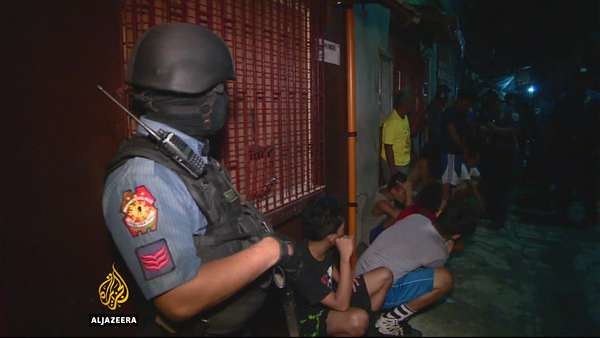Human rights workers have argued ‘wars on drugs’ in Asia are feeding into dangerous international norms of impunity, drawing parallels between a campaign launched by former Thai Prime Minister Thaksin Shinawatra and that of current Philippine President Rodrigo Duterte.
At a panel hosted at the Foreign Correspondents’ Club of Thailand (FCCT) on Wednesday, 31 August 2016, experts voiced concern over the explicitness with which Duterte has flouted international law to enact a wave of extrajudicial killings of drug traffickers in the Philippines.
“We are in very odd international law territory in that President Duterte seems absolutely inclined to say things that seem to make him vulnerable to international prosecution,” summarised Sam Zarifi, the Asia Director for the International Commission of Jurists.
Upon entering into office two months ago, the Philippine president began a campaign to purge the country of drug dealers and users through aggressive methods of assassination, disappearances and violence. According to Jonathan Head, BBC News’ Southeast Asia Correspondent, there have been some 2,000 targeted killings by police, hired assassins and associated vigilantes in the last two months — a drastic spike since the country recorded 7,245 murders in 2015.
But an FCCT statement warned that “Duterte’s deadly campaign is not without precedent in Southeast Asia”. In 2003, Thaksin launched a similarly aggressive campaign against drug traffickers and users that contributed to as many as 2,800 extrajudicial killings in its first three months, a large proportion of which are speculated to have been unrelated to drugs.
“In many ways, watching what is going on in the Philippines is like watching a remake of the war on drugs,” said Sunai Phasuk, a senior researcher on Thailand from Human Rights Watch. “The rhetoric I observe used to praise Duterte is exactly the same used by people to praise Thaksin in 2003.”
Panellists speculated that Duterte’s audacity in committing serious crimes against humanity may have some roots in Thaksin’s proving a decade earlier that a ‘war on drugs’ is not likely to result in international prosecution, and may even generate electoral popularity.
Sunai pointed out that while subsequent governments established Commission Inquiries into deaths resulting from Thaksin’s war on drugs, little prosecution followed despite ample evidence: “a culture of impunity is there”.
Jonathan Head, BBC New’s Southeast Asia Correspondent, pointed out that both Thaksin and Duterte formed provocative campaigns designed to elicit support from populations widely impatient with previous government’s perceived inactivity.
‘You have the same kind of bitter frustration and anger there that we saw among the PDRC for example. Interesting that these people are supporting an abrasive populist whereas the PDRC was supporting the establishment against an abrasive populist. But both often have echoed this feeling that their country has failed, that something just has to be done.’
The impunity enjoyed by Thaksin despite the scale of his human rights abuses has arguably now emboldened Duterte in his own war on drugs. Duterte has shown no restraint in making public statements demonstrating a clear intention to kill or incite killings such as in one statement: “My order is shoot to kill, I don’t care about human rights … this war is against drugs and we have a crisis.”
Zarifi argued such explicit disregard for human rights may show a breakdown of human rights norms in Southeast Asia, since statements demonstrating premeditated intentions to commit crimes against humanity automatically make one liable to be tried under the International Criminal Court.
“Usually leaders around the world try to distance themselves from international crimes … Very rarely is there a clear order from the government that says, ‘OK, go ahead and kill all these people,’” noted Zarifi.
Panellists disputed whether Thaksin’s violent methods actually decreased the country’s net trafficking and usage of drugs. Zarifi argued that statistics show the ‘war’ did not fulfil its aims.
But Nick Nostitz, a journalist of Thai politics, argued that his interviews and photography of previously drug-ridden communities have attested to Thaksin’s success.
‘The reality is that it worked, and I’m pretty sure in the Philippines it will also work.’

Filipinos police hunting down alleged drug dealers in Manila's suburbs (Photo from: Al Jazeera)
Prachatai English is an independent, non-profit news outlet committed to covering underreported issues in Thailand, especially about democratization and human rights, despite pressure from the authorities. Your support will ensure that we stay a professional media source and be able to meet the challenges and deliver in-depth reporting.
• Simple steps to support Prachatai English
1. Bank transfer to account “โครงการหนังสือพิมพ์อินเทอร์เน็ต ประชาไท” or “Prachatai Online Newspaper” 091-0-21689-4, Krungthai Bank
2. Or, Transfer money via Paypal, to e-mail address: [email protected], please leave a comment on the transaction as “For Prachatai English”
